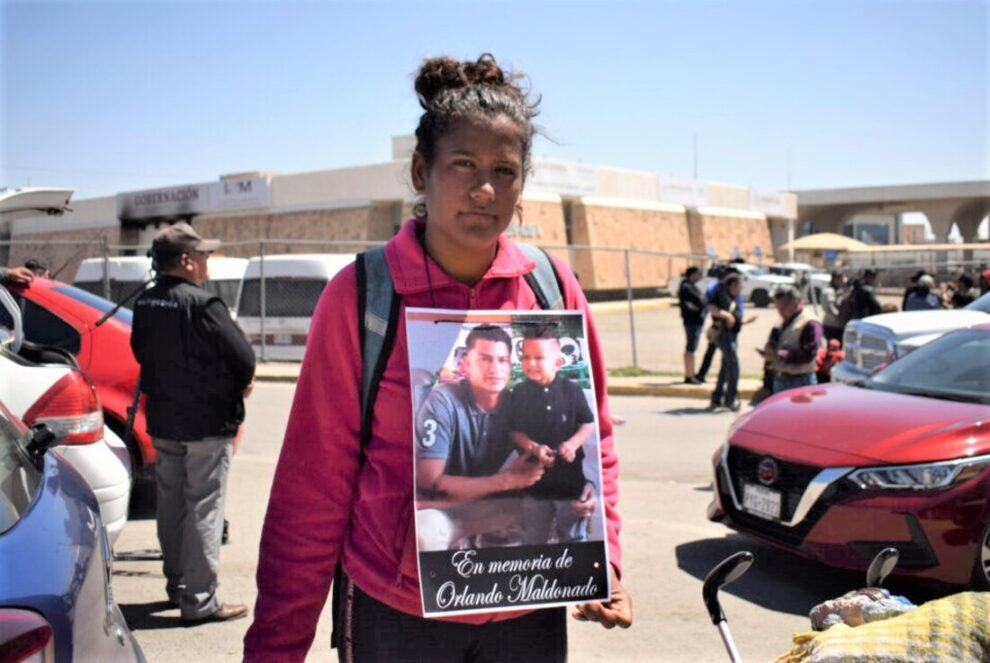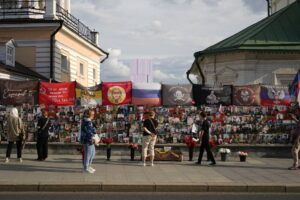CIUDAD JUÁREZ – “Nando,” as his family called him, grew up in San Cristóbal, Venezuela. At 26, he was forced to leave his home country due to its dire economic situation. He first went to Panama and from there made his way to the Mexico-U.S. border to Ciudad Juárez a stone’s throw away from El Paso.
Nando, whose full name is Orlando José Maldonado Pérez, is one of the 39 migrants who died during the March 27 fire at the National Migration Institute’s detention center in Juárez.
“We are devastated by the inhumane and unfair way in which my brother died. Not only him but (people of) all nationalities who died. Nobody deserves to die that way. They left in search of a future, of a dream,” Nando’s sister, Mileivy Maldonado, said in a phone interview with La Verdad from the state of Táchira in western Venezuela.
The last few days have been full of anguish and uncertainty for his family. Since learning of his death from media that listed the names of those killed or injured in the fire, his parents and sister cry for him from Venezuela; his wife and son from Panamá; and other relatives from Chile, Argentina, Spain and the United States where they’ve migrated over the years.
His wife, Daniela Orozco, said that for months, Orlando went from border to border and from country to country trying to achieve his dream: to cross into the United States to work and raise his child.
“He has his brother there,” Orozco said. “He had hopes of seeing (the country) and seeing how things work there and if he could get a job. He wanted to know if the United States was all it’s portrayed to be.”
His dream was cut short.
Now his body is in the morgue, and his relatives are waiting for information that gives them clarity about what happened to him. The responses they’ve received from consular authorities of Venezuela and Mexico have been few, Mileivy Maldonado said.
It was Nando’s friends, some of whom traveled with him from Panama, who went to the forensic offices to identify his body. However, they were initially informed there that he was not on the official lists of victims, leaving them baffled. The State Attorney General’s Office only told them to look in the city hospitals.
The back and forth has only caused the family more grief. Without official confirmation, they doubt his death – even as the Mexican Ministry of the Interior listed Nando as one of the 39 people who died in the fire.
“We are far away. We can’t go looking for him. We can’t be with him,” his sister said.
Mileivy Maldonado said the Mexican Embassy in Venezuela asked for copies of her brother’s and father’s documentation, photos and a list of physical features such as tattoos and scars that could help identify him. The Venezuelan Embassy in Mexico told her only that they’re working on the case.
“We are here with our arms crossed waiting for the Mexican government, the Venezuelan government or some authority to contact us to give us information. What else can we do?” Mileivy Maldonado said.
Six arrested, detention center closed
Mexican federal authorities last week issued arrest orders for six people in relation to the fire, including a migrant who is alleged to have started the fire. He was arrested after being released from the hospital last week and is charged with intentional homicide, injuries to others and damage to property.
The others arrested include officials from the National Immigration Institute and private security guards contracted by the agency. They face charges of homicide and causing injuries.
The director of the National Migrant Institute in Juárez has been ordered to provide a statement to investigators but has not been charged in the fire.
The holding area at the institute, which sits at the foot of the Stanton Street bridge connecting Juárez and El Paso, has been closed indefinitely following the fire. Undocumented migrants will be taken to other federal facilities, including the migrant integration center Leona Vicario in Juárez, federal officials announced Friday.
Detained in crackdown
Nando, like others being held at the migration institute, was detained when authorities cracked down on migrants on the streets, according to friends who were with him at the time.
Mexican immigration authorities have said the objective was to remove migrants from the streets to protect children escorted by municipal police and human rights groups; while federal security leaders said the crackdown came after residents complained that the migrants were aggressively demanding money from them at intersections.
Katiuska Márquez said she and her husband, Abel Ortega Ovieda, with their two young children, took to the streets to ask for help from motorists driving by. They were with Nando when they all got detained by immigration agents and transferred to the holding cell at the detention center.
Márquez, her husband and their children, who are from Venezuela, were released shortly after.
“When they separated me from him, I saw him through a window and told him that I was going to wait for him,” said Márquez, adding that she considered herself more like a sister to Nando. “In the morning when I got up and saw the news, I thought ‘I could have died like that.’”
Her cousin, Daniela Márquez, carries a photograph of Nando on her chest.
She said she remembers that Nando had approached several auto shops in downtown Juarez asking for a job, but didn’t find any business that had positions open.
“A good man died. A man who had plans. He had a mother and a family in Venezuela who were waiting for him with open arms, and now they have to wait for him in a box of ashes,” Daniela Márquez said.
Federal officials said the migration institute was working to return the bodies of those who died in the fire to their home countries with coordination by the Ministry of Foreign Affairs and the ministries of Colombia, Ecuador, Guatemala, Honduras, El Salvador and Venezuela.
“The least they can do is hand over our brother to us. We want a dignified and fair burial,” Mileivy Maldonado said. “They say that they burned to death and that others died of suffocation. We want to know what state my brother’s body is in to see how it can be brought to Venezuela.”
Fighting for a better life
Nando and his wife left Venezuela in 2017 and migrated to Panama where their son, Julián, was born. They lived there for three years, and Orlando worked as a mechanic and in construction.
In 2020, the couple returned to Venezuela for what they hoped would be a short period of time, but the pandemic kept them there longer. They returned to Panama in October 2022.
“I wanted to settle here in Panama, however, Orlando insisted that he wanted to go to the United States,” his wife said.
He left Panama two months ago and arrived in Juárez about two weeks ago. He last contacted his wife a day before the fire, notifying her he had arrived at the border.
She didn’t hear from him for a few days – until a friend from Venezuela informed her of the fire and that Nando was listed among those detained that night.
“It was quite shocking and there are no words to describe the intense pain of seeing my son and thinking that he lost his dad,” Orozco said.
Nando had also kept in touch with his relatives in Venezuela and Chile. He often shared photos of meals he shared with his fellow migrants and the streets of Juarez where he would sell candy to pay for a hotel and food.
“We were not aware that he was in that migrant center,” said his cousin Génesis Chacón, a Venezuelan now living in Chile.
“He didn’t want to stop for anything. He was very excited and wanted to fight for his son and give him a better life,” said Chacón, who last had contact with her cousin on March 25. At the time, Nando told her he had to be patient and wait to get an appointment to seek asylum at a port of entry through the CBP One app.
His friends and family describe Nando, who sold his car to help him pay his way to the United States in hopes of meeting his brother in Miami, as a man with a huge heart who always had a passion for mechanic work and painted homes for extra income. In Venezuela he had a “bodeguita” or a convenience store where he sold food and basic products.
“Thirty-nine migrants did not die,” Mileivy Maldonado said. “Thirty-nine human beings who had the right to life – who had a father, mother, children, brothers – died. They were immigrants, but also people who had a dream.”
Source: Elpaso Matters









